A Thread on Bid’ah by Ustadz Mahmoud al-Masri

This article was taken from a thread by Ust. Mahmoud Al-Masri (from the USA) which was to refute another thread. This other thread (which he refuted) has been deleted, but the relevant refuted tweets are cited below. I hope this is beneficial for all, and may Allah shower his blessings towards Ust. Ustadh Mahmoud and all of us.
==============================
We’ll split this in two parts. Part 1 defining terms properly using Qur’an and Sunnah and part two a refutation of the garbage he’s spouting on the tl.
First Part:
Defining Bid’ah in the Arabic Language and in the Shari’ah: البدعة (al-Bidعa) as explained in Lisan al-‘Arab is “Every Muحdath (newly invented matter without prior example). and (as used) in the Hadith of Umar in the Qiyaam of Ramadan ‘what a good innovation this is’”
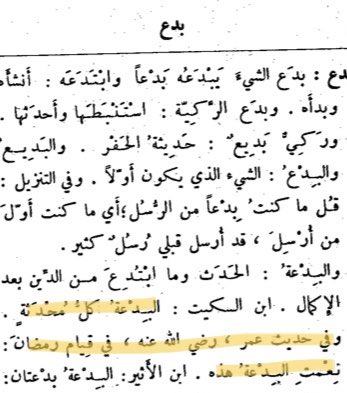
This already is a refutation of the stupid claim he made that Umar used bid’ah in the Shar’i sense to describe taraweeh. Which I’ll address further on. As for the usage of the word in the linguistic sense in its different morphological forms in the Qur’an, we have these ayat:

The subject matter of all the بدع in these ayat is different. Showing how broadly it can be used in its linguistic sense. For ex: I can call a car, a lightbulb, a phone etc. Bid’ah, which is all linguistically correct. But this should not be confused with the second meaning….
The Shari’i meaning of Bid’ah: As with everything in the deen, we must have proof from the Qur’an and Sunnah to define it, as opposed to this one who just gives quotes from some random Ash’ari from the 8th century as proof (which is ironic but more on that later).
The first Hadith we’ll use is the Hadith of A’isha in Bukhari: “Whoever aحdath (innovates) into this affair of ours (Islam) that which is not from it will have it rejected.”
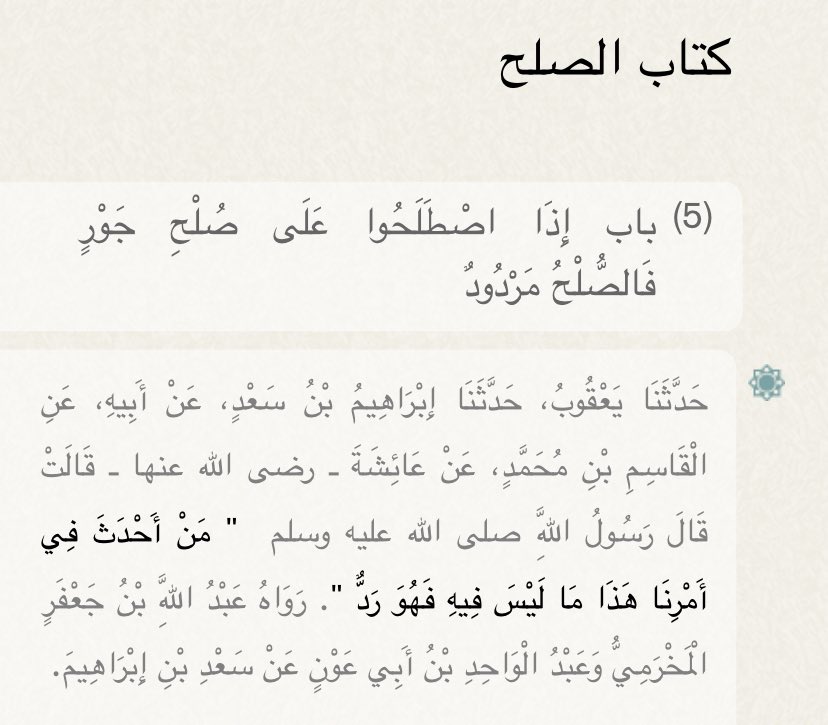
The prophet peace be upon him says “من أحدث” (Whoever innovates) and this is could refer to all innovated matters. But then he qualifies it by adding “في أمرنا هذا” (in this affair our ours), which now specifies it to the religion this excluding all worldly affairs.
And then he ﷺ adds ANOTHER qualifier “ما ليس منه” (that which is not from it), meaning having no basis in the deen.
Ibn Hajar says, in Fath al-Bari:
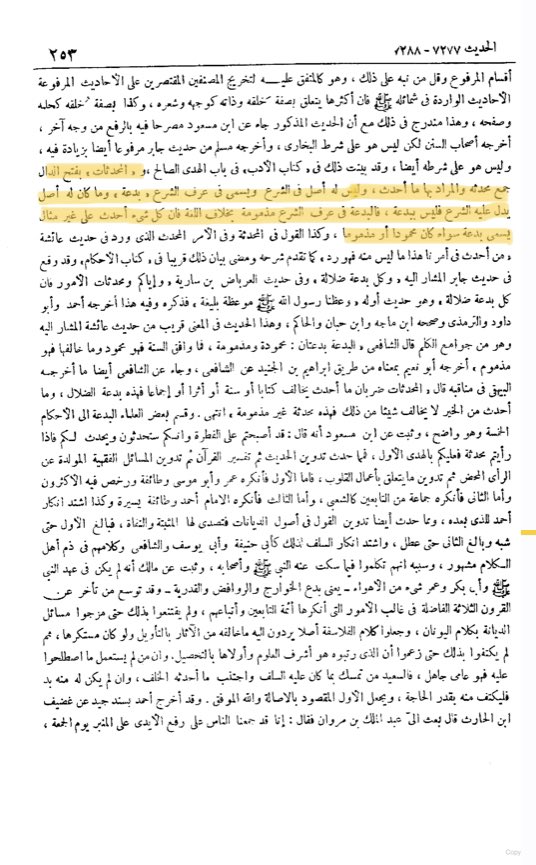
“And المحدثات (Muحdathaat) with the fatحa on the د, is the plural of محدثة (Muحdatha) and what is intended by it is what has been newly invented and does not have any basis in the Shari’ah. It is referred to in the Shari’ah as بدعة (Bidعah). As for what has a basis indicated by the Shari’ah then it is not an innovation. Because “Bid’ah” in the usage of the Shari’ah is BLAMEWORTHY, as opposed to its linguistic usage, everything that has been newly invented without any prior example is named ‘bid’ah’ regardless of whether it is praiseworthy, or blameworthy.”
So here Ibn Hajar clearly explains that every innovation into the religion is blameworthy as opposed to the linguistic usage which can either be praiseworthy (like a lightbulb) or blameworthy (like heroin).
Next we have the Hadith of Irbaad in the Sunan of Abu Dawood which everyone has heard in at least one Jum’ah: “…Beware of newly invented matters for every newly invented matter is an innovation and every innovation is misguidance.”
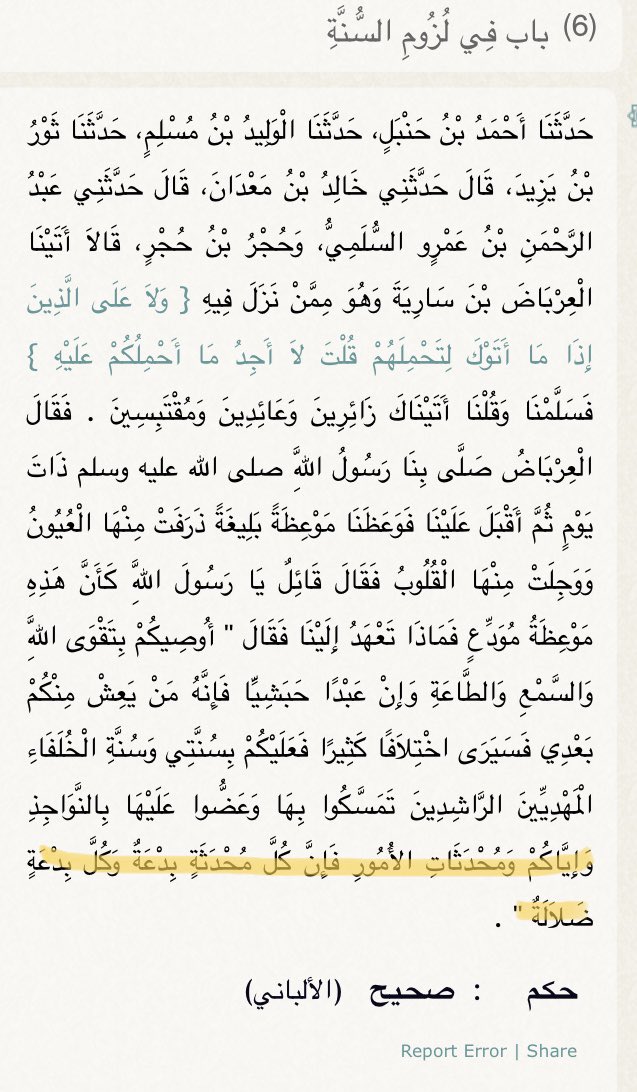
Ibn Hajar quotes this Hadith on the very next page in the explanation of the aforementioned Hadith of A’isha: “And the intended by ‘every innovation is a misguidance’ is whatever is newly invented and has no evidence for in the Shari’ah in neither a general nor a specific way.”
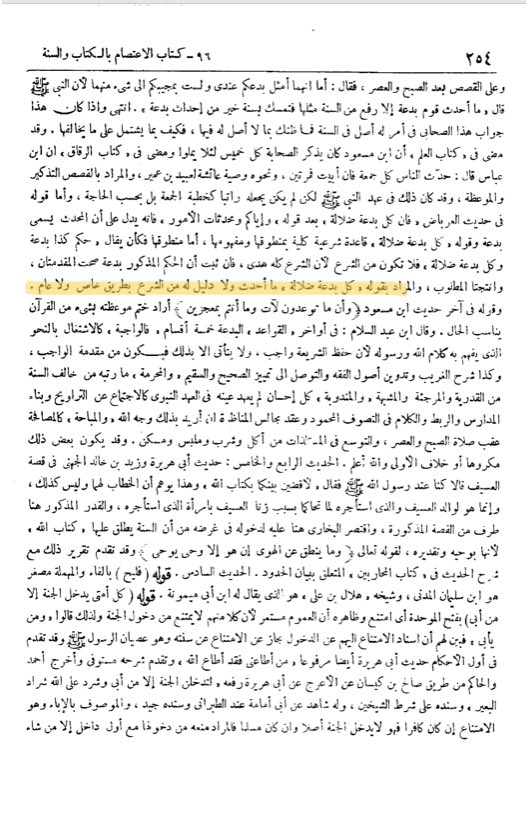
And there are many other Hadith prohibiting Shar’i innovation but we’ll suffice with these two Insha’Allah for the sake of being concise. So now we have established two things:
1. Bid’ah can be used linguistically to refer to any newly invented worldly affair, which can either be praiseworthy or blameworthy.
2. Bid’ah can be used in the Shar’i sense to refer to anything newly introduced into the religion. Which can ONLY be blameworthy. And this is the case with many words used in the Qur’an and Sunnah. Their Shar’i meaning is more specific than the linguistic one.
An example is صلاة Salah: Linguistically it means دعاء dua (refer to Lisan al-Arab again), but Shar’i it is still dua but means a very specific set of actions and statements performed in order to worship Allah.
Second Part
The first is al-izz Ibn Abd as-Salam categorization of Bid’ah into 5 categories.
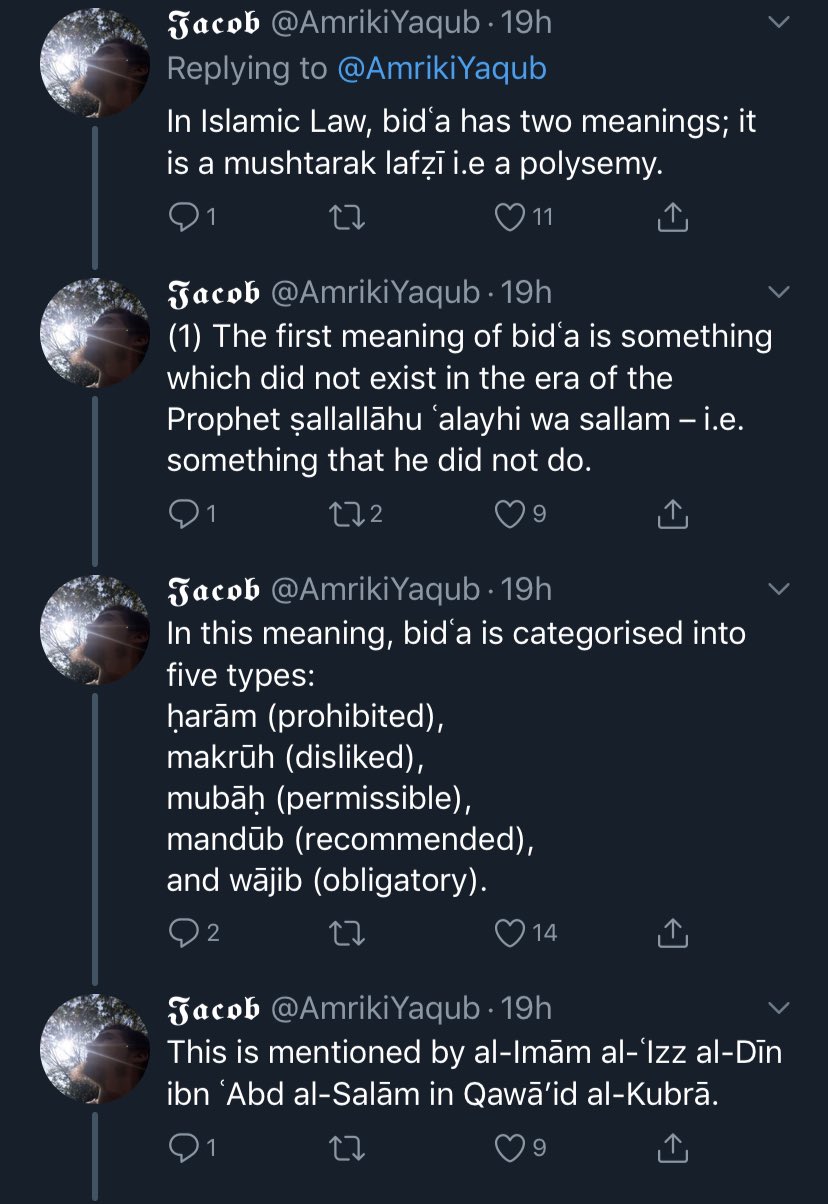
Ibn Hajar quotes this in Fath al-Bari and there’s no need for me to address it bc Abu Iyaad حفظه الله already broke down this shubha in great detail, read this Insha’Allah.
Secondly he shows his ignorance of what we have already established of Lingusitic vs. Shar’i bid’ah.
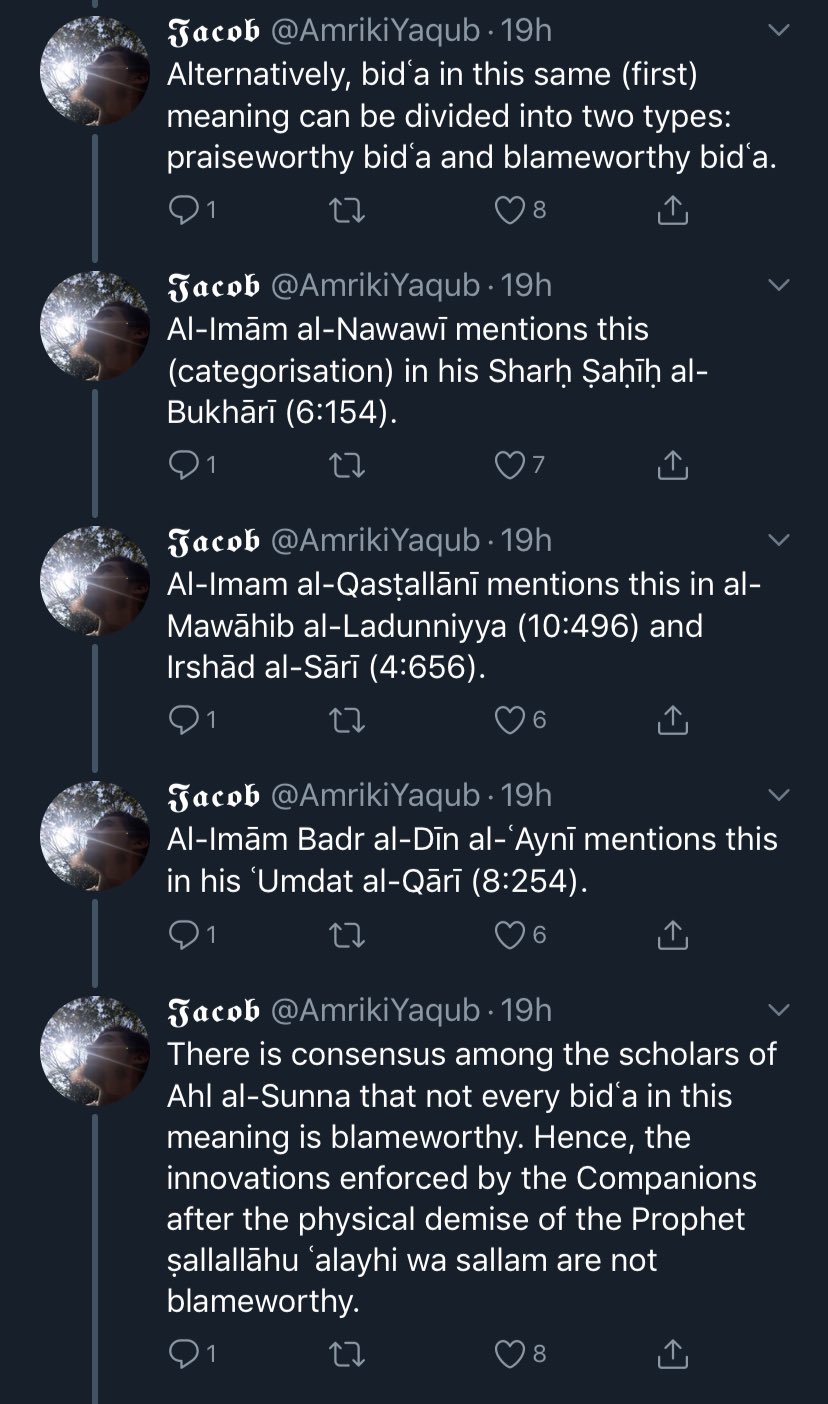
When the scholars like an-Nawawi and Ibn Hajar use “praiseworthy innovation” (bid’ah hasanah) it is only in the lingusitic sense as explained by Abu Iyaad.
Here he shows further ignorance, by giving the example of Ali رضي الله عنه and Nahw.
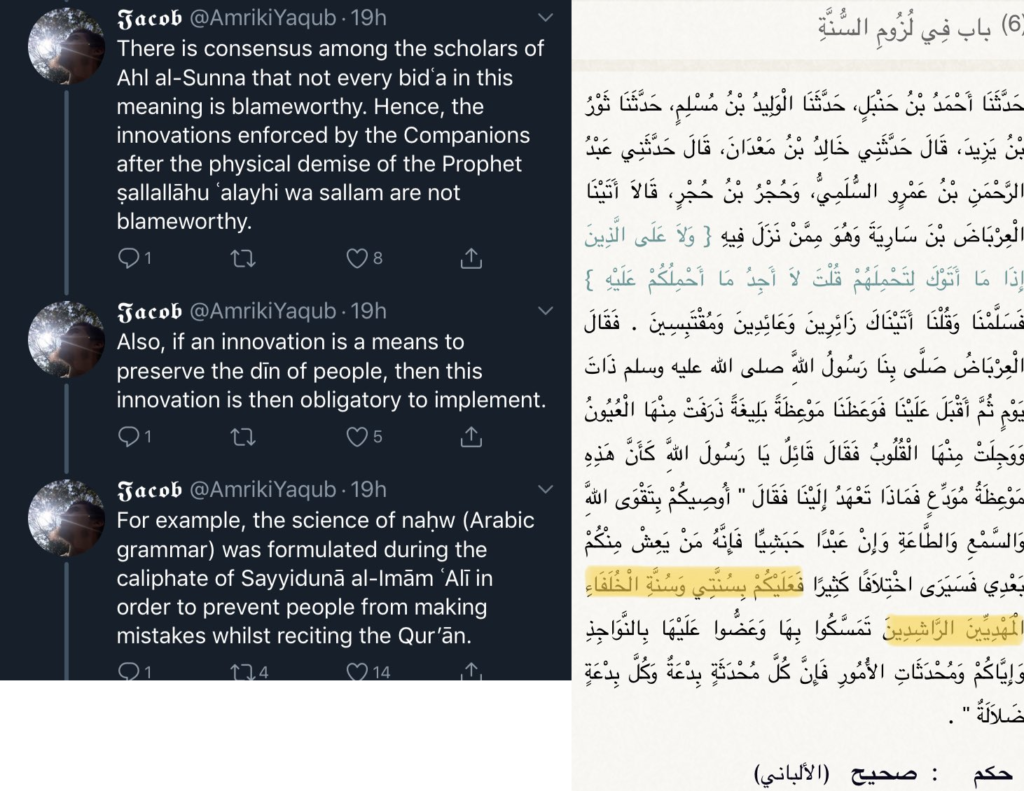
The prophet ﷺ said, “Follow my Sunnah and the SUNNAH of the rightly guided Caliphs” Meaning anything which the rightly guided caliphs do is by definition sunnah therefore it is only ever lingusitic innovation and never enters the conversation of Shar’i bid’ah.
The second angle of which it’s not a Shar’i bid’ah is because this is built upon the general principle of “preserving the religion”, meaning it has precedence in the deen.
And as we discussed before, bid’ah is that which has no basis in the deen, neither general nor specific. This one has a general precedent. Moving on, we having already refuted this ignorant claim per Ibn Hajar’s explanation where he shows that every bid’ah in the Shari’ah IS WITHOUT exception bad.
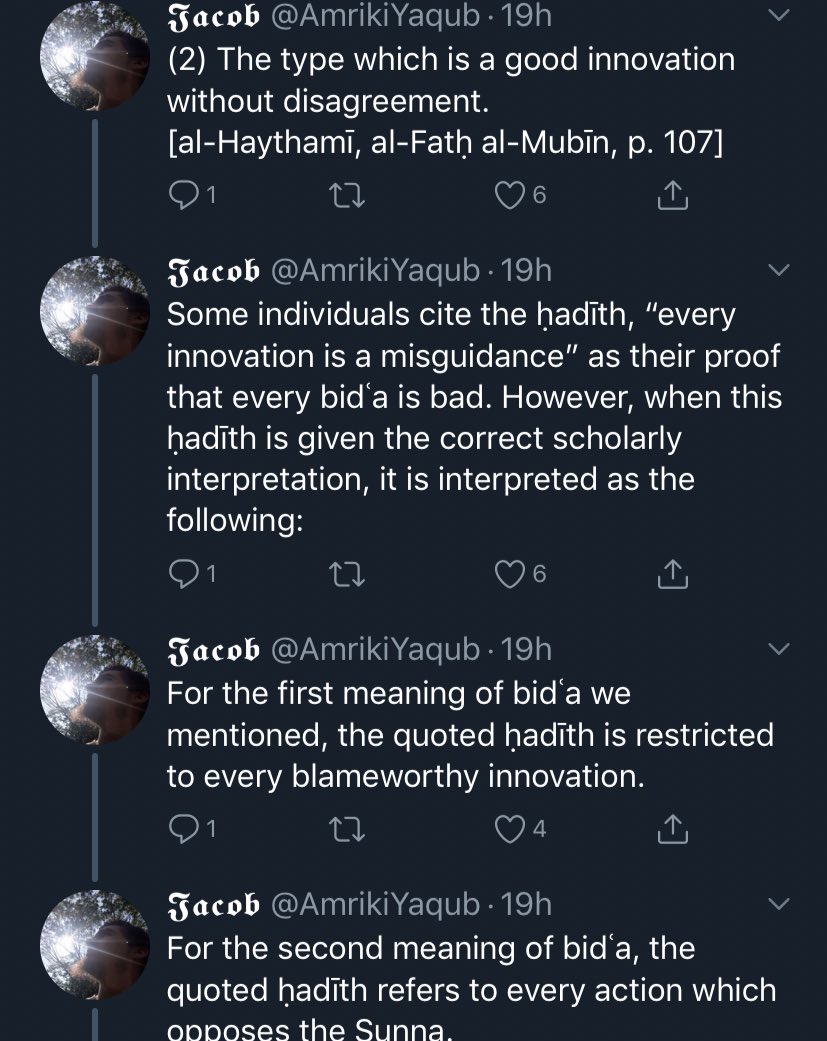
As aforementioned once again, Umar is one of the rightly guided Caliphs, therefore his actions are sunnah. irregardless, the prophet ﷺ prayed taraweeh, so this is a specific precedent. What Umar did was combine it under one congregation.
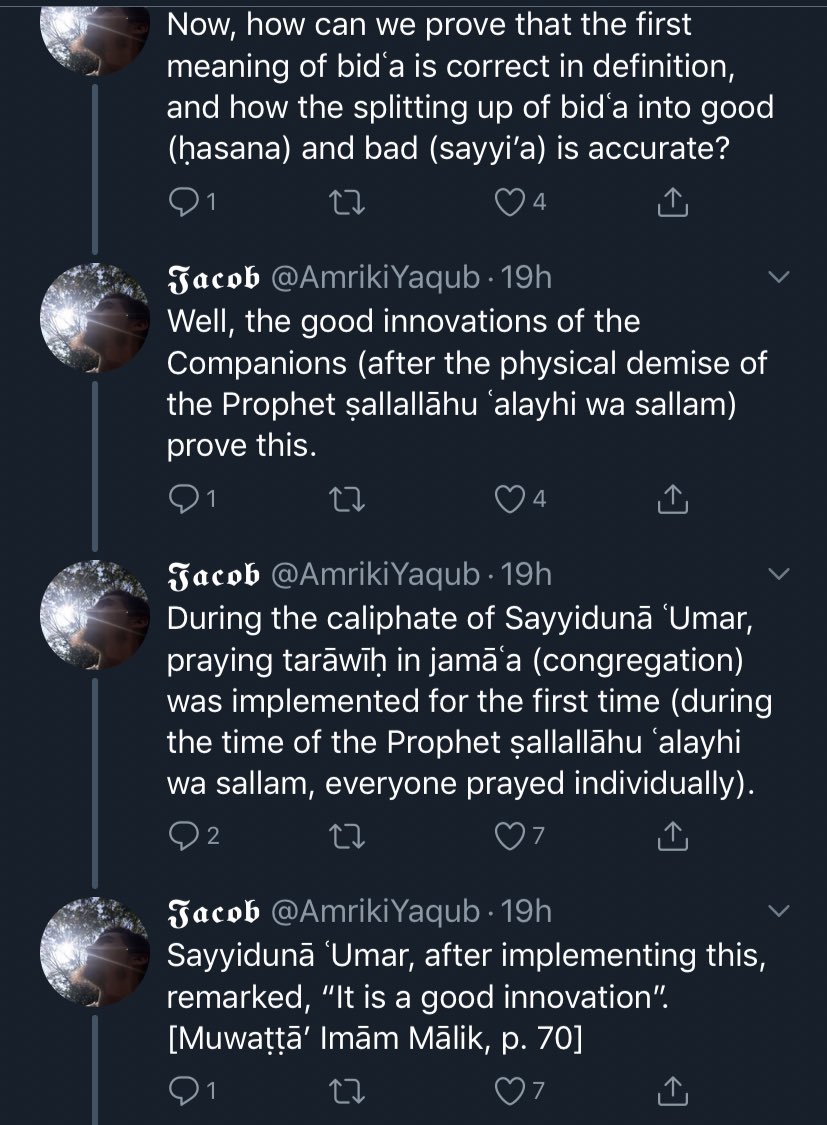
And as aforementioned, the scholar’s use of “good innovation” refers only to the linguistic sense. When Umar رضي الله عنه said “What a good innovation this is” he is referring to praying it behind a single imam, this is a linguistic use of the word not a shar’i one.
Once again showing his ignorance of not only the Arabic language but of the ahadith.
This next bit regarding salat al-Duha cements his ignorance of both the Langauge and the Shari’ah.
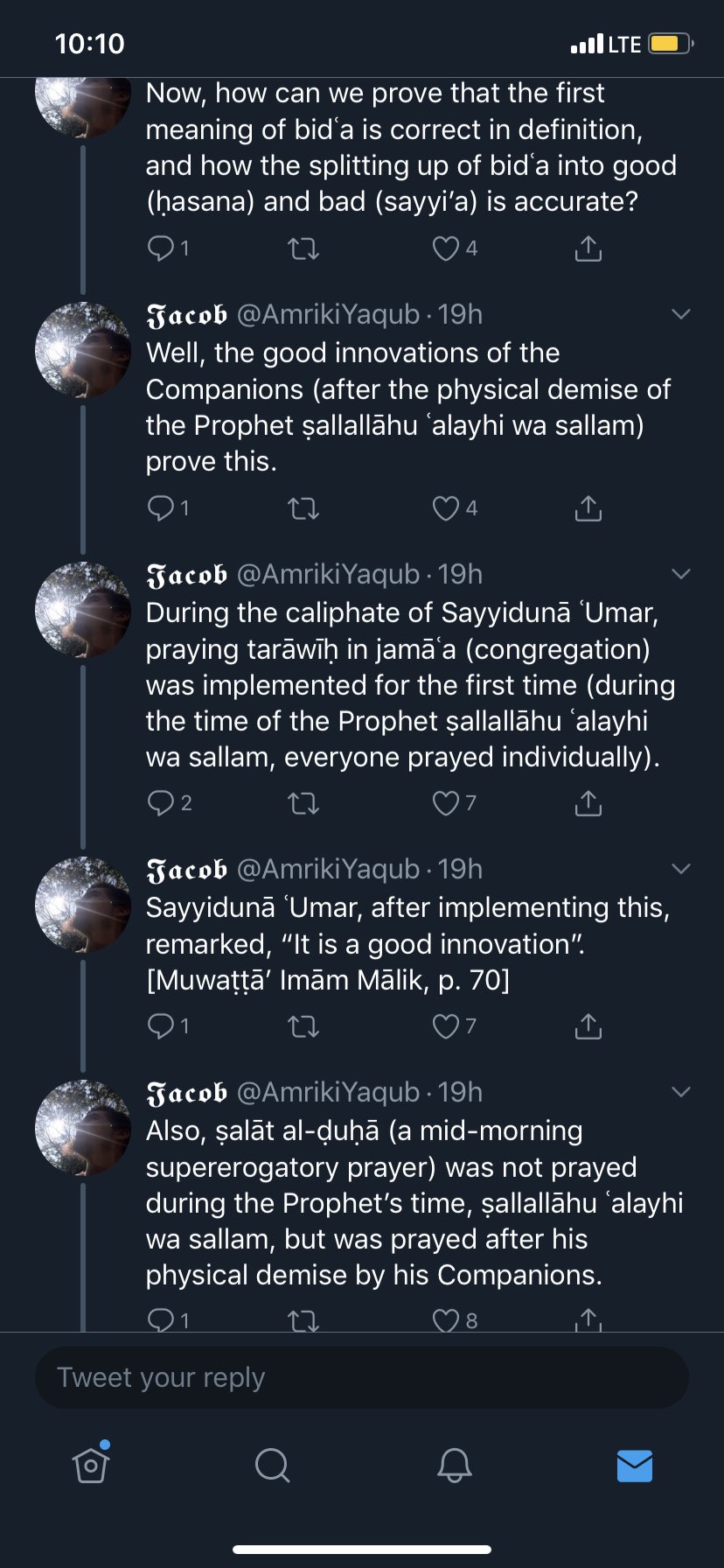
“Salat ad-Duha was not prayed during the prophet’s time”…. here are 3 Hadith from ONLY the two Sahihs showing that the prophet prayed it.
And EVEN IF for the sake of argument we say Umar was the first to do it… we already explained why the actions of the rightly guided Caliphs are sunnah.
He then continues and gives another example, compiling the Qur’an….Once again:
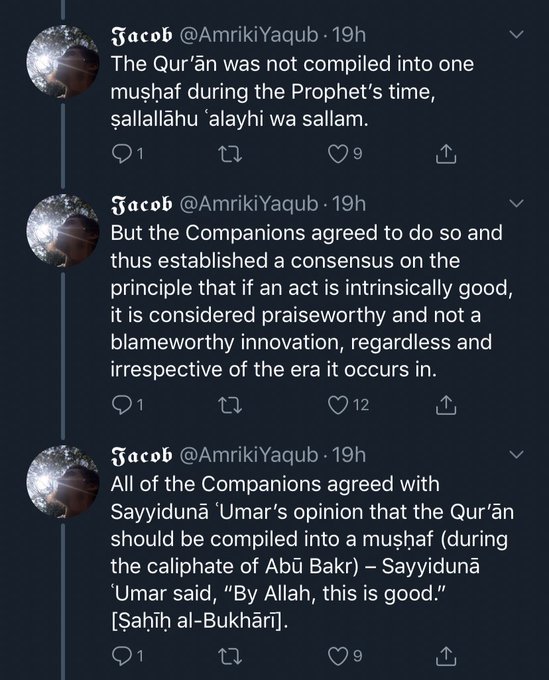
1. Abu Bakr and Uthman رضي الله عنهم (both Rightly guided Caliphs) did it.
2. It falls under “preserving the Shari’ah” which is a principle in the deen, and as aforementioned, the statement of Umar is in the linguistic sense.
He then brings the Hadith of the prophet in Muslim (pic below) as if that’s a proof for his nonsense claim.
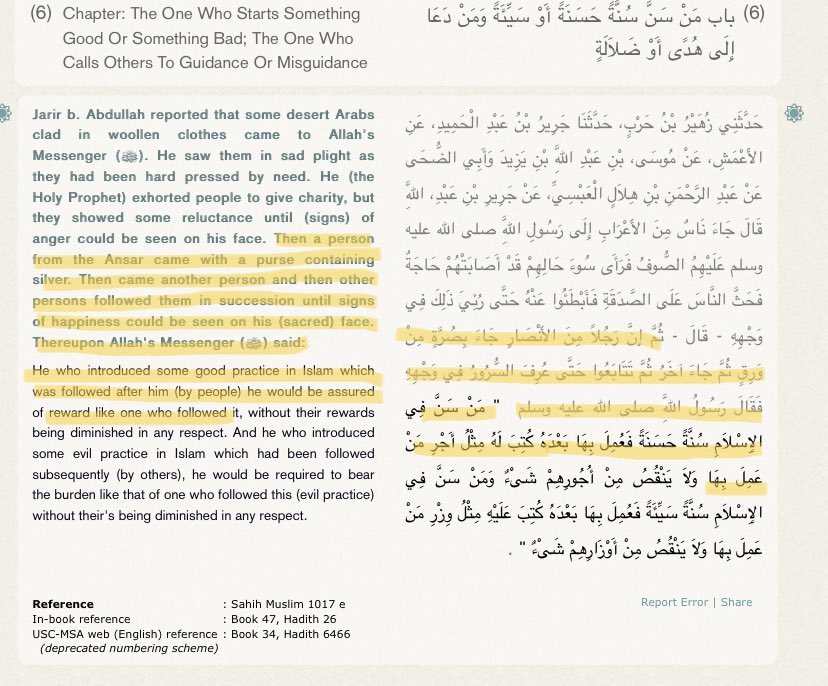
The context of the Hadith is of a man who gave CHARITY and then others followed his example. Not of this refers to Shar’i innovation and once again he lied upon an-Nawawi, as Abu Iyaad explains in the aforementioned article.
Lastly, he says this as if it’s a proof against following the salaf. This is nonsensical garbage, which has been addressed here by our brother in detail. No need for me to repeat.
This is the conclusion of his nonsensical thread which only portrayed his lack of knowledge in the Arabic language and of the deen. So don’t be deceived by these Juhaal my brothers and sisters. None of these issues would arise if we returned to the understanding of the salaf.
So here I will conclude with this statement of Imam Mālik وحمه الله on this issue of “Bid’ah Hasanah” in the religion.
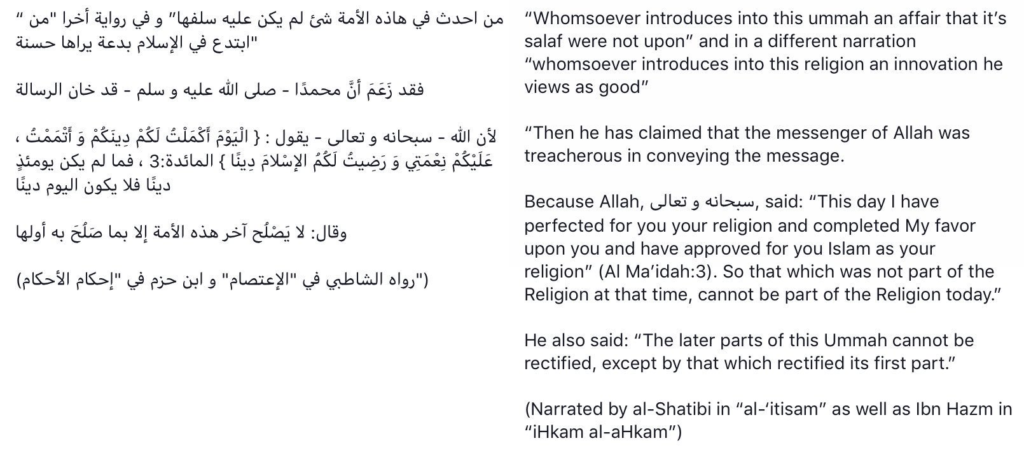
And as Ibn Sirīn said: “This knowledge is religion is look who take your religion from” (Muqadimah of Sahih Muslim)
Don’t take knowledge from Juhaal on twitter trying Arabic and Deen when:
1. They haven’t studied Arabic
2. They haven’t studied deen
And if you would like a more in depth refutation of these juhaal’s claims of “Good innovations” I refer you to Abu Iyaad 8 Part refutation. Very in depth and well written.
barakAllah feekum
=====================================
PS: I have asked Ust. Mahmoud’s permission to post this thread in my blog


